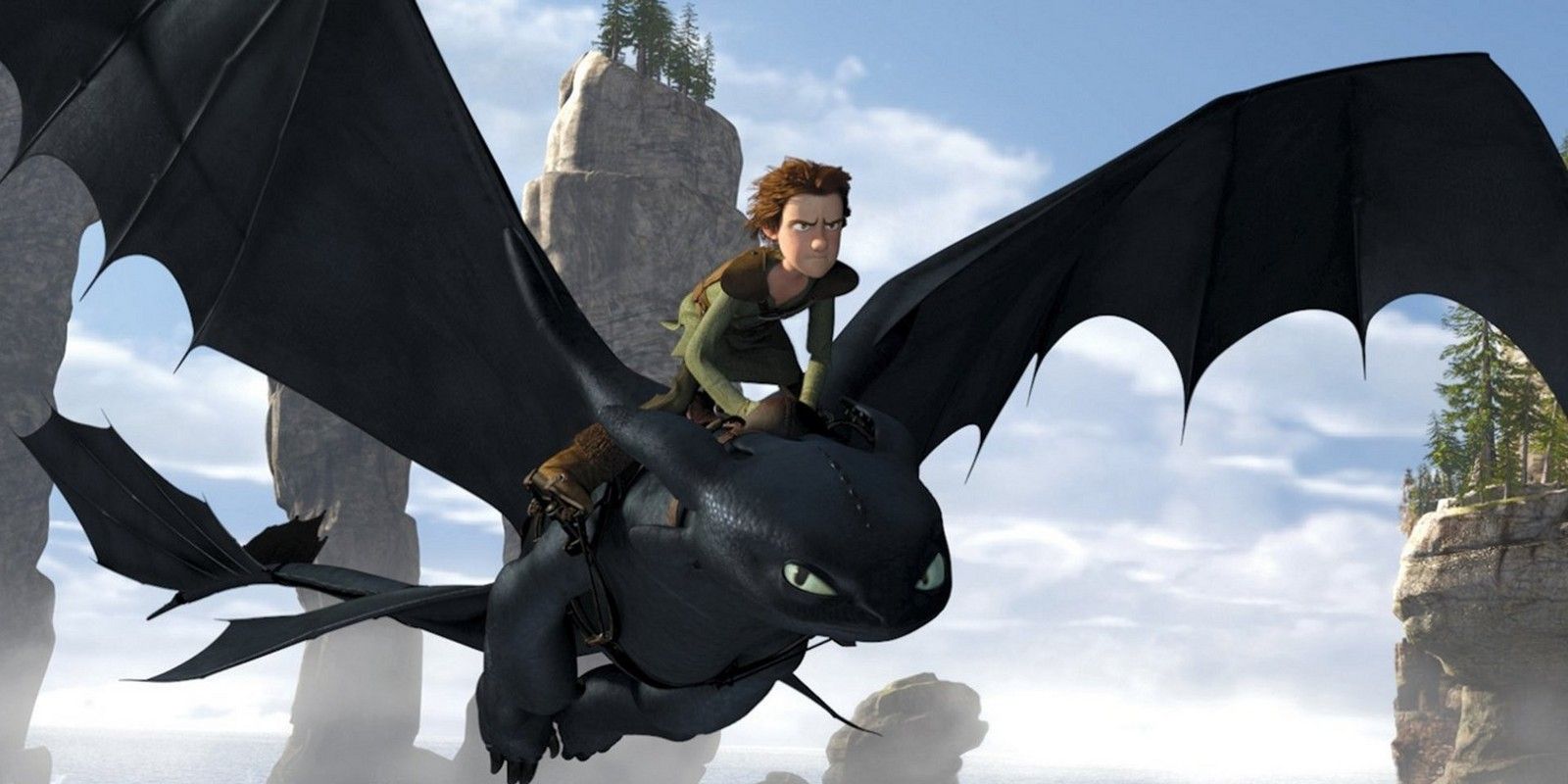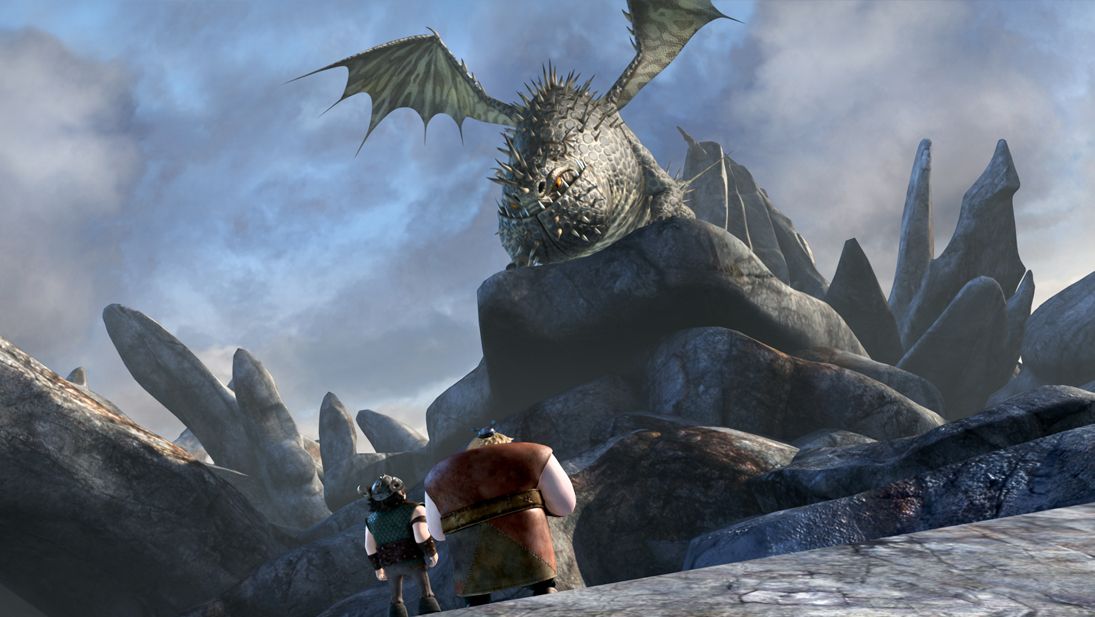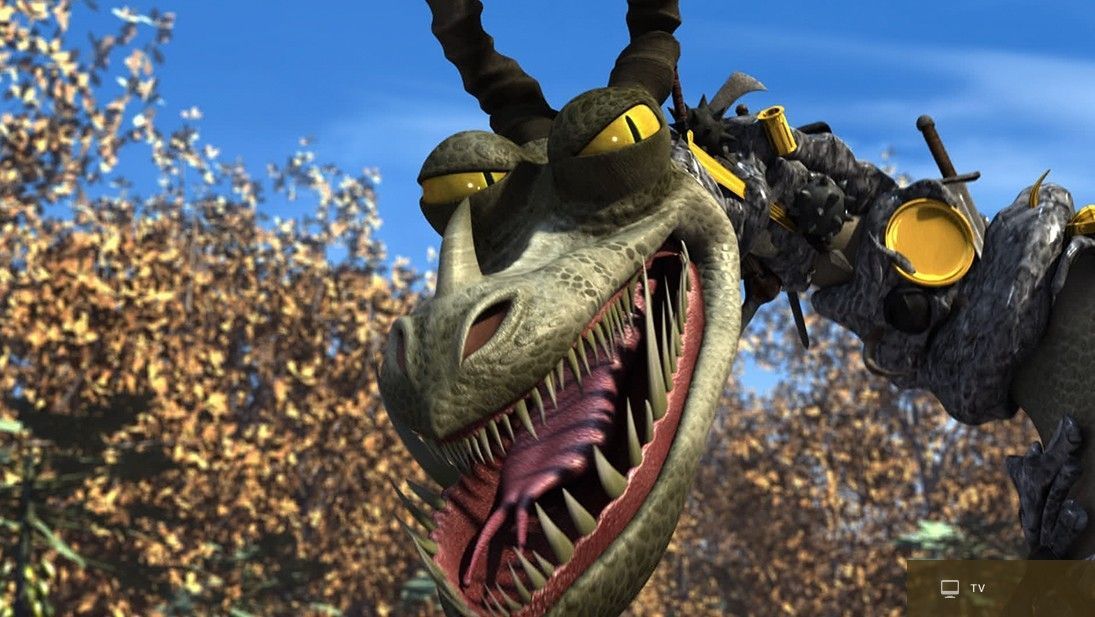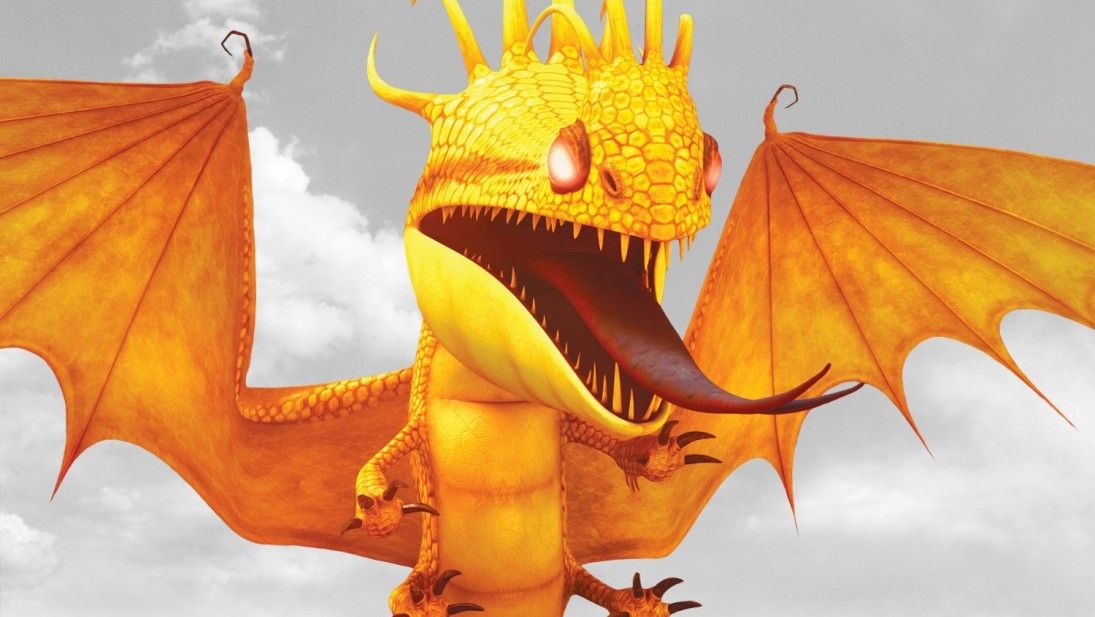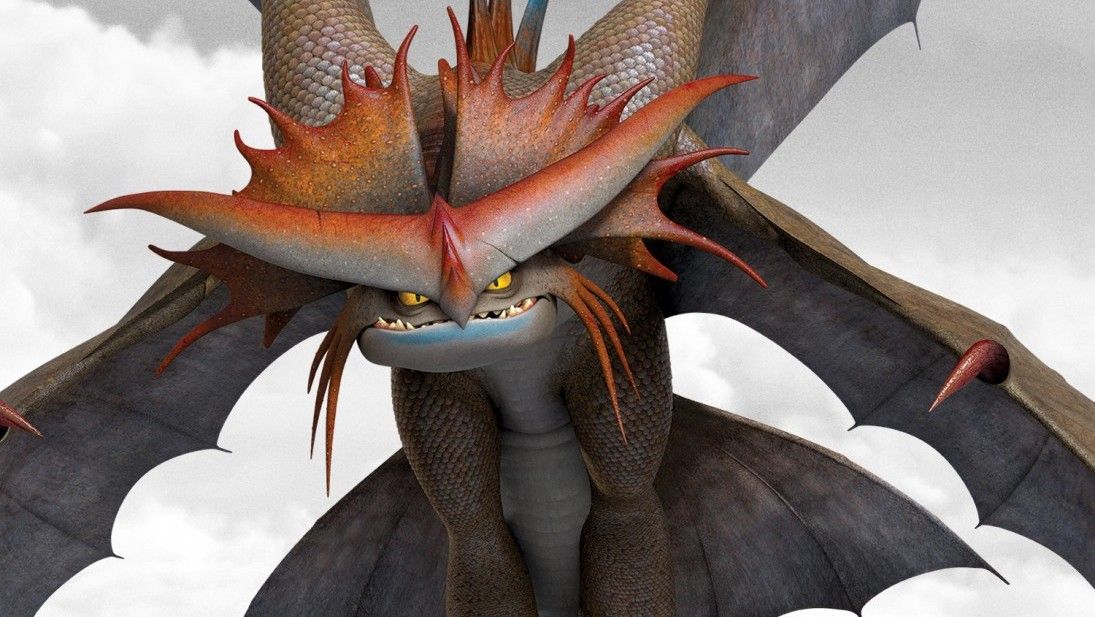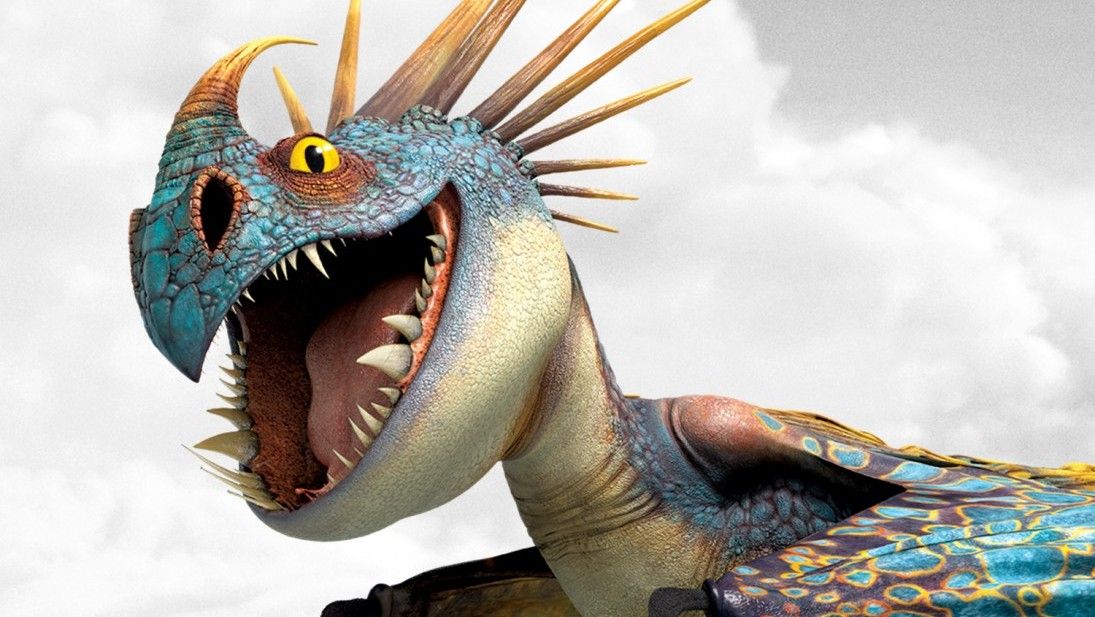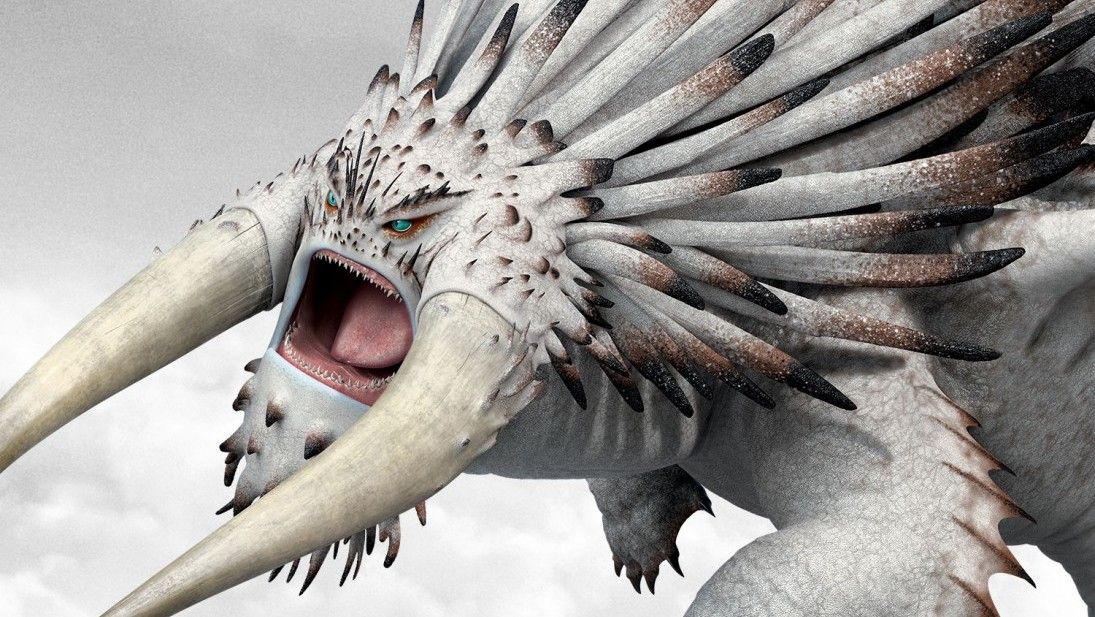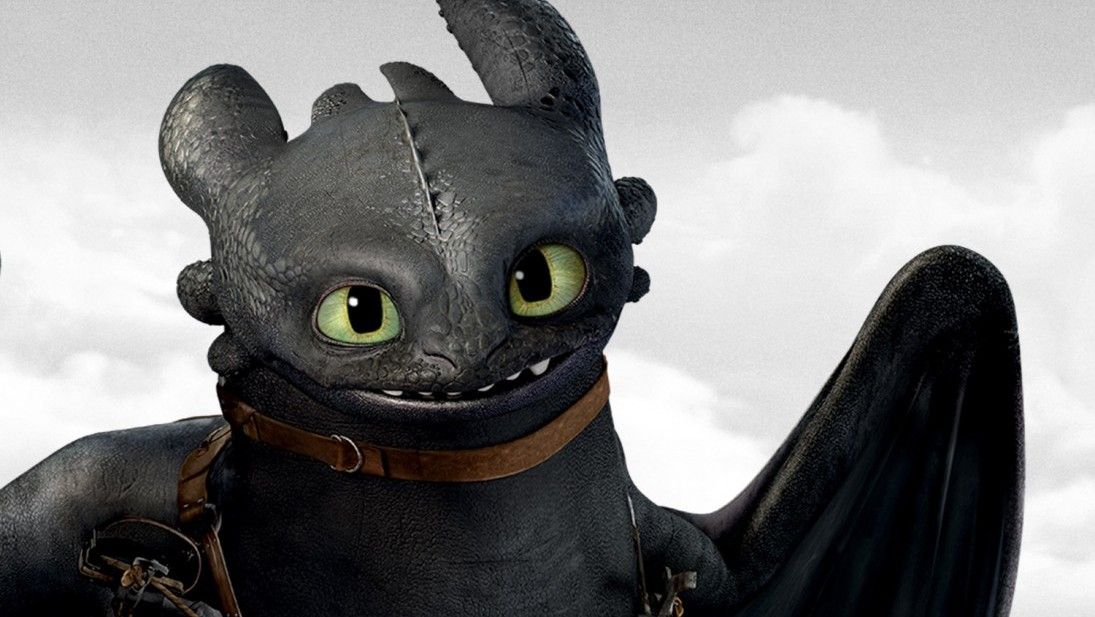Between the three movies and the multiple TV series, an absolute ton of dragons have been introduced to the How to Train Your Dragons franchise. Some of them are iconic and easily recognizable, like Toothless. Others are a bit more obscure and require a more in-depth understanding of the dragon types available.
RELATED: How To Train Your Dragon 3 Is A Box Office Success (After One Weekend)
Here is a complete list of all the dragons in the franchise. But be warned, this list includes dragons introduced during How to Train Your Dragon 3: The Hidden World. Some of them you’ve probably already seen in the trailers, so it isn’t a spoiler. Others have been explicitly hidden from the trailer and should be considered a spoiler for the conclusion of the movie.
Class
Catastrophic Quaken:
The Catastrophic Quaken is a stone eating dragon, hence their preference for hanging around in rocky areas. They will act like an armadillo when threatened, which is actually pretty cute. They can go on the offensive side, too, but that is thankfully less common. When forced, they can use their stone-like body to send shockwaves through the earth, easily knocking down any flightless opponent.
Crimson Goregutter (New):
The Crimson Goregutter looks exactly like what would happen if you managed to combine dragons and deer together. They have large and strong horns on the front of their heads. They’re really quite majestic. Like the species they resemble, they’re mostly peaceful but are fully capable of defending themselves when needed. When forced, they can spit molten lava same as some dragons spit fire.
The Crimson Goregutters make their first appearance in How to Train Your Dragon 3.
Gronckle:
Gronckles are basically fat, armored hummingbirds. They’re one of the toughest dragons out there, but they don’t really act like it. They’d prefer to laze around and play all day, rather than fighting. Gronckles are the only dragons that can fly in any direction – just like a hummingbird. Their proportion is dramatically off, with a large body and tiny weeks comparatively. Also, did we mention that their eggs explode? Astrid and the group learned that one the hard way. Meatlug is the best known Gronckle and is the companion to Fishlegs.
RELATED: How To Train Your Dragon 3 Ending Explained: What Happens To The Dragons & Berk
Eruptodon:
The Eruptodon is exactly like you’d picture, given the name along. They’re a species that eats lava, and generally prefer to live within volcanoes and other sources of their food. Their choice in location also helps protect them from a lot of enemies, but not all. Dragons are an obvious exception to that rule. They don’t have much by way of attack, but can eat most of the fire and lava shot at them by other dragons.
Hotburple:
Hotburples can easily be confused with Gronckles. They eat lava and ore, unlike the species they so strongly resemble. They’re loud and lazy, which is another thing they have in common with Gronckles. Their attack, unsurprisingly, is a lava based attack. They can shoot out lava or flaming chunks of rock with surprising consistency. Grump is a Hotburple, and is also a companion to Gobber, and their personalities are oddly suited for one another.
Sentinel:
Sentinels very much live up to their namesake. They have the appearance of stone, and can stay incredibly still. This combination allows them to blend in with their surroundings, and become better lookouts for what they are protecting. They’re the guardians of the dragon graveyard, and they take their job seriously. They can’t see, but all of their other senses make up for this lacking. Their primary weapon, ironically, is sound based. They can let out sonic screeches and wing blasts.
Shovelhelm:
Shovelhelms are large and blocky dragons. They have a pointed chin, stubby arms, and a paddle-like tail. They use their shovel-shaped head as an attack method, which is appropriate for them. They’re surprisingly fast for their size, but they’re not too bright.
Snafflefang:
Snafflefangs are another solid dragon type. They have a spiked tail and diamond shaped teeth. Their preferred diet is geodes, which is fortunate for the people around them. It does, however, make them a bigger target for other dragon types, as well as humans trying to capture them.
Whispering Death:
The Whispering Death prefers to live on and under the ground, as opposed to in the sky. They are constantly hungry, which makes them an enormous threat. Their multiple rows of teeth make them even more frightening, and with good reason. They don’t have great eyesight though, which is common for ground-dwellers. Screaming Death is the best-known dragon of this species.
Mystery Class
Armorwing:
Armorwings have a lot in common with some of the traditional legends of dragons; where they hoarded shiny and metallic objects. However, the Armorwing does something special with his hoard. He’ll weld the metal objects to his body, giving an extra layer of protection from attackers.
Boneknapper:
The Boneknapper is considered a mysterious and disturbing dragon by many. This is mostly due to their armor preference. The Boneknapper will collect bones and form the collection of them into armor. They won’t just choose any bone though, and instead will always go with the best fit. Perhaps that is why they always look so striking.
Buffalord:
The Buffalord is probably the most passive dragon of the bunch. Unfortunately, that means that this dragon has been hunted to near extinction. There are still a few around, thankfully. They’re predominantly grazers, and while they won’t seek out a fight, they will not allow a human to come along and chase it out of its preferred field. When threated they can shoot out spikes from their hide, and do a great imitation of a puffer fish.
RELATED: How To Train Your Dragon: The Hidden World Review - A Moving Finale
Cavern Crasher:
Cavern Crashers look more like lizards with really large teeth, but they’re still a dragon. They’re a striking black and gold, with a narrow snout that’s almost beaklike in appearance. They’re a ground-dwelling species, preferring to spend their time underground. They can defend themselves via a flammable mucus they secrete.
Changewing:
Changewings are listed as being one of the most dangerous dragons in the Book of Dragons. Granted, a lot of that information has become outdated once the Vikings stopped hunting them. Much like Chameleons, Changewings can blend into their surroundings with ease. Their offensive weapon is a corrosive acid capable of burning through even stone. Despite all of this, Changewings are surprisingly expressive and will hunt together in formations similar to a lion pride.
Deathsong:
The Deathsong has a frightening name, and it certainly earned it. Despite that, they are by far the most colorful and arguably most beautiful dragon out there. They look similar to a butterfly in many ways. A butterfly capable of releasing amber like mucus, that is. The mucus will trap its prey, which happens to typically be…dragons.
Dramillion:
Dramillions are kind of cute and even look like a winged T-Rex. Okay, a purple and winged T-Rex. They’re parrot-like in nature, being able to mimic any other dragon attack they see – and yes that does apply to all of their fire attacks. It’s actually a little bone chilling.
Flightmare:
Flightmares are also beautiful in their own right. They have a striking blue glow to them, thanks to their bioluminescence. They gain this through the algae they eat, thus it isn’t natural to them. They’re a mostly defensive species, but that doesn’t mean that they’re not territorial. In fact, they can get quite put out when another dragon or hunter enters their territory. This is probably because they don’t do well up against larger dragons, resulting in them feeling uncomfortable around any or most of them.
Zippleback:
The last dragon on the list is the Zippleback. The Zippleback is a two-headed dragon. The two heads allow for a clever way around the blind spot issue in dragons. Each head provides a different resource as well. One produces gas and the other a spark. You can guess what happens next. Ruffnut and Tuffnut have a Zippleback dragon. This may or may not have been a good call, depending on how well you think they get along. Their dragon’s heads are named Barf and Belch, respectively.
Sandbuster:
The Sandbusters are the pirates of the dragon world. Like the traditional myths of dragons, they love to hoard their gold. They live under the shores of the Northern Markets, and will happily sink and steal from any passing ships foolish enough to come to close. They’re vulnerable to sunlight, which isn’t a common issue among dragons.
Slitherwing:
Slitherwings almost look like a fancy kite, but don’t make the mistake of approaching them. They’re venomous and hunt in packs. The reason they are so bright is the same reason that nature makes all venomous creatures bright, as a warning.
Smothering Smokebreath:
Smother Smokebreaths prefer to be left alone and do not respond well to Vikings heading into their land. Despite this, they really would rather stay hidden than start a fight. They stay in packs and can create smoke clouds as a way of concealing themselves.
Snaptrapper:
Snaptrapper is a four-headed dragon, of all things. They’re a beautiful shade of green; though don’t let their looks distract you. They release a scent that might tempt you closer, but that would be a fatal mistake.
Stoker Class
Fireworm:
Firworms are beautiful, in a fiery sense. They have flaming hot skin, and typically either four or even five pairs of legs. The species is best known for the Fireworm Queen – a female capable of laying thousands of eggs in her life. They’re similar to bees in this sense, and in that she makes a firecomb for her dozens of eggs to grow in.
Hobblegrunt:
Hobblegrunt have a beautiful and large frilled section on their heads. Their tails have a similar design. The color of their scales changes based on their mood, which is probably helpful for the new dragon trainers out there. Gruff is the best known example of this species. He’s another one of the many dragons that Valka has become fond of.
Hobgobbler (New):
Hobgobblers are one of the smaller dragon species out there. They’re small and stocky, with little spines on their back. They look like little scaled pugs in many ways. Despite their size they’re quite destructive – especially when in larger groups. Together they can and will eat anything in their path.
Hotgobblers are making their first appearance in How to Train Your Dragon 3.
RELATED: 10 How to Train Your Dragon Theories So Crazy They Might Be True
Monstrous Nightmare:
The Nightmare is an aptly named dragon. They have long necks and boast a chilling number of spikes along their head and body. And don’t even get us started on the teeth. This dragon is probably the most similar to European dragon mythology, with a more traditional plume of fire and deadly abilities.
Snotlout’s dragon is a Nightmare, and has the very appropriate name of Hookfang.
Night Terror:
The Night Terrors don’t look like the most intelligent species out there – due mostly to their duller looking eyes and wide-set face. They’re fast flyers, and they prefer to be out during the night. Making them more nocturnal. The Night Terrors generally prefer to be in packs, which makes them stronger, but also more vulnerable to being picked up by an alpha dragon.
Red Death:
Red Death can easily be confused with Bewilderbeasts. They’re enormous dragons and can act as alphas in an area. We’ve only seen the one, so for all we know Red Death is a unique creature. They rely on other dragons to bring them food – but they are capable of putting up a good fight on their own. Their size alone is an advantage in the fight, but they can also produce massive volumes of flame.
Singetail:
Singetails are another aptly named species. Where most other dragons let loose their attacks through breathe attacks, the Singetails release it through their jaws, gills, and tails. This makes the attack extremely difficult to avoid. Another thing that makes them stand out? They don’t have the typical dragon weakness – there is no blind spot to deal with. They can see 360 degrees, thanks to their chameleon-like eyes.
Terrible Terror:
Terrible Terrors are cute little dragons. They’re the smallest of the known dragon species and are relatively harmless. Well, they’ll curious little critters who will get into all sorts of trouble, but they won’t try to eat you at least. Scuttleclaw is the most famous Terrible Terror. He’s the little dragon Hiccup befriended in the first movie.
Threadtail:
Threadtails are beautiful dragons. They’re teal and yellow, with a very long neck. They have a head frill, as well as poisonous skin. This is not a dragon you want to come in contact with, to put it lightly.
Typhoomerang:
Typhoomerangs are another forest dwelling dragon. They’re massive enough to raise questions about how well they do in dense woods, however. They can release cyclonic jets of flame and are known for having a fiery temper.
Sharp Class
Cloudjumper:
Cloudjumpers are a species that may look rather angry and stubborn, and admittedly they may have slightly earned that reputation. They have two sets of wings, allowing them to have superior flight control. They’ve the most agile and maneuverable dragon there is in the sky. Their attack is more traditional, being long bursts of fire. Stormcutter is the best known dragon of this breed. He belongs to Valka, Hiccup’s mother.
Grim Gnasher:
Grim Gnashers are smaller, and dare we say cute? They’re not the smallest dragons out there by any means, but they’re up there. Grim Gnashers act much like carrion birds, circling around their chosen prey – almost always already injured, of course. Grim Gnashers may act mostly like carrion, but they have a trait in common with sharks as well. They’ll regrow their teeth with ease. Which is fortunate, considered their preferred diet—dragon—is likely tough on the teeth.
Raincutter:
Raincutters have an alarmingly long jaw, and sharp fins on their backs. Their neck is long and matches the shape of the head. They’re a water-based dragon, as probably evidenced by the shape of their bodies. They love worms and rain more than anything else.
Razorwhip:
Razorwhips are a beautiful metallic black dragon species. They’re more aggressive than many other dragon types, and won’t hesitate to start or finish a fight. Their namesake is their barbed tale that can squeeze or slice as needed.
RELATED: Hiccup Is One Year Older In How To Train Your Dragon: The Hidden World
Speed Stinger:
Speed Stingers would be best compared to Velociraptors. Like Velociraptors, they’re intelligent, fast, and aggressive. To make matters worse, they can fly. That’s great for them, and bad for their prey. They hunt in packs, with one Speed Stinger to lead the bunch.
Timberjack:
Timberkjacks are dragons with beautiful shimmering brown wings. They predominantly live in the woods. They prefer the peace that a healthy wooded area can bring. When attacked, or adequately irritated, their beautiful wings can be turned into powerful weapons. They have sharp spikes and claws all over them.
Thornridge:
Thornridges are a bright green dragon with red and yellow accents. They have spikes on their head and frills, as well as a long neck and. They predominantly eat fish, thus preferring to stay near the water.
Windstriker:
Windstrikers have a long neck and beautifully bright wings. They use super-heated blasts of air as their primary form of attack. They’re fast flyers, and can even make it look like they’re diving in the sky, thanks to their speed.
Tracker Class
Deadly Nadder:
The Deadly Nadder is a tracker dragon by nature. Their strong sense of smell helps them overcome one weakness that most dragons have – a blindspot in front of their nose. This is a lesson that Ruffnut and Tuffnut had to learn the hard way. Deadly Nadders use fireballs to take down their prey or enemies, and generally will stay at a distance until the fight is over. The Deadly Nadder is the dragon that Astrid ended up with. She fondly named her dragon Stormfly.
Rumblehorn:
Rumblehorns are blocky and solid dragons. They have a clubbed tail and a wide maw. Their neck is armored, and you can clearly see the delineations in their scales. They’re another tracking dragon. Their main attack is a charge where they bend their heads down and let their solid head and neck do the work.
Skullcrusher, Stoick’s dragon, is the best example of a Rumblehorn.
Snifflehunch:
Snifflehunches are a brightly colored dragon species with a long protrusion under their chin and on their nose. They’re another tracking species, and are capable of producing a fire-sneeze attack. Their distinctive humps are capable of expanding in size as well.
RELATED: How To Train Your Dragon 3 Is the Best Yet Says Gerard Butler
Submaripper:
Submarippers are another massive water dragon species. They’re possibly the origin of the myths about Krakens, for all we know. They create whirlpools to drag their prey down to their depths. On the bright side, they won’t do that to ships unless they’re foolish enough to try and pick a fight. Apparently, Vikings are too small to be considered prey in other circumstances.
Thunderclaw:
Thunderclaws are another tracker dragon. This is a breed of dragon that prefers to spend their days surrounded by others of their kind. They’re a pretty calm and happy species on the whole. But unlike a lot of herding animals, they’re fully capable of defending themselves as needed. Bonesnarl is one of the named Thunderclaws. Snotlout briefly was able to ride this dragon.
Windgnasher
Windgnashers are a tough looking species, with a bulbous protrusion on their heads. They have a humpback as well. They are excellent trackers, being able to pick up a scent from extreme distances. Their primary attack is an ice blast, which may be a bit surprising thanks to their green coloring.
Tidal Class
Bewilderbeast:
The Bewilderbeast is an Alpha dragon. That means that they have the ability to bend other, smaller dragons to their will. It’s not an ability given though, but one that earned. They have to fight their way to the top, and then must defend their title from other Bewilderbeasts. Bewilderbeasts are massive creatures, and can easily shape their surroundings to their preference. There have been two characters associated with Bewilderbeasts, both in How to Train Your Dragon 2. Valka and Drago both had Bewilderbeasts companions in that plot arc.
Scauldron:
Scauldrons look a little comical, with their large gullets similar to a pelicans. Scauldrons are another dragon that prefers to be near the sea. They stick together in pods, and their favorite meal? Dragons. They shot out boiling water, which explains the purpose of their large gullets. Their biggest vulnerability is their dependence on water. They will dry out if they spend too much time away.
RELATED: DreamWorks Adapting How To Train Your Dragon Creator's New Book
Seashocker:
Seashockers are basically giant fish with wings. They share a lot of traits with dolphins and manta rays, as well as some bioluminescence. The species has two heads, though they don’t seem to be multipurpose like the Zipplebacks. They’re a water based species, obviously. But they can send electrical currents through the water – an effective tool for hunting.
Shellfire:
Shellfires are another ocean living dragon, and they are enormous. They predominantly live in the deep sea, and they sort of have to. No other aquatic biome would be able to support their size. While capable of producing breathe attacks, their size frequently makes it unnecessary.
Thunderdrum:
Thunderdrums are capable of opening their mouths to insane proportions, allowing them to let loose a powerful concussive sound. The sound alone is strong enough to kill a human if they’re close enough, so watch out.
Strike Class
Deathgripper (New):
The Deathgripper is a truly scary looking dragon. They’re predominantly black, with dark red accents along the wings and underbelly. The coloring combined with the large bottom teeth and stinger on the tail certainly makes them worthy of their name. The stinger is exactly that as well – just like a scorpion, the tail is capable of producing venom. The Deathgripper made its first appearance during How to Train Your Dragon 3.
Light Fury (New):
Light Furys have been getting a lot of attention ever since the trailer for How to Train Your Dragon 3 came out. The female Light Fury is strikingly beautiful, and is the perfect opposite of Toothless. Just like Night Furys, Light Furys have retractable teeth. Their scales are reflective, and they can shoot plasma blasts.
Light Furys make their first appearance in the newest movie, How to Train Your Dragon 3.
Night Fury:
Whenever we think of Night Furys, we naturally think of Toothless. He’s cute and inquisitive, and acts surprisingly like a cat when he’s with Hiccup. Before the events in the first How to Train Your Dragon movie, Night Furys had the worst reputation of the bunch. They had never been seen by humans (none that survived, at least) and are best known for attacking in the night, where they cannot be seen. His attack is a sort of charged energy blast, giving off quick but powerful bursts.
Night Light (New) (Spoiler Warning):
Night Lights are the adorable cross between Night Furys and Light Furys. Their looks aren’t consistent, but are generally a blend of white and black other their bodies. They have the reflective scales and retractable teeth known to both species. Presumably, their attacks work the same way as well.
Night Lights make their first appearance in How to Train Your Dragon 3.
Skrill:
Skrills are an electricity type dragon, funneling lightning through their spines. They also have the ability to store this electricity, releasing it at a later time. This ability means that they’ll almost always be out during a storm. Their one major weakness is that their ability does not work when they are emerged in water.
Snow Wraith:
Snow Wraiths are possibly the only dragon without any of the common vulnerabilities. They’re hardy and great survivors. They also have thermal vision, useful for tracking in colder environments. They became important during the Dragon Riders series, when it became clear that they could unlock the Dragon Eye device.
Triple Styke:
Out of all the dragons, the Triple Styke probably looks the most like a Pokémon. They’re a bit on the cranky side, and aren’t afraid to show it. They have barbed and strong hides, and a set of three spikes on the end of their tail. They’re capable of shooting intense bursts of fire.

